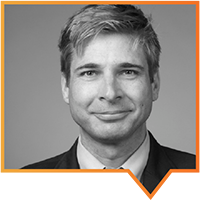This two-day symposium, Thursday, October 27 and Friday, October 28, is designed for doctoral students, faculty and staff at the University of Florida. It will focus on the challenges of teaching in today’s polarized political environment. It will be held in the Keene Faculty Center.

Dr. John Rose, Associate Director of the Civil Discourse Project (opens in new tab) at Duke University’s Kenan Institute for Ethics, will lead this collaborative and conversational two-part workshop. He will share his experiences designing and teaching How to Think in an Age of Political Polarization over the past four years, including his strategies for motivating students and creating an atmosphere of openness and trust.
Workshop participants will be asked to share their classroom experiences and thoughts about civil discourse among students at UF. Together, attendees will address some of the difficult academic questions surrounding political discourse on campus—for instance, the limits of free speech, viewpoint epistemology, classroom norms, and the value of intellectual diversity.
The forum consists of two half-day sessions. Lunch is provided. The program is divided into a morning and afternoon session each day. Participants can attend either the morning or afternoon session on each day.
On Thursday, the workshop explores the increased focus on civil discourse in the classroom and delves into what’s at stake for instructors and students in the current moment. Friday builds on these discussions by further considering the strategies and goals for incorporating more civil discourse into the classroom. Again, participants can choose whether they want to attend in the morning or the afternoon, which they will select during registration.
The forum is free to attend, but registration is required (opens in new tab).
The forum is hosted by the College of Liberal Arts & Sciences (opens in new tab), the Bob Graham Center for Public Service (opens in new tab) and the Dial Center for Written & Oral Communication (opens in new tab).
Register Now (opens in new tab)
A short list of suggested readings that serve as aids to discussion are provided below. Any additional materials will be provided to registrants no later than Friday, October 21.
Suggested Readings
Day 1
- Martin Luther King, Jr., Loving Your Enemies (opens in new tab)
- John Rose, How I Liberated My College Classroom (opens in new tab)
- How to Think in an Age of Political Polarization Syllabus (opens in new tab)
- Polarization Seminar Essay Prompts (opens in new tab)
Day 2
- Emma Camp, I Came to College Eager to Debate. I Found Self-Censorship Instead (opens in new tab)
- Sam Leith, In Defence of Wokeness (opens in new tab)
- Michael Roth, Anxiety About Wokeness is Intellectual Weakness (opens in new tab)
- Cornel West and Robert George, Truth Seeking, Democracy, and Freedom of Thought and Expression Statement (opens in new tab)
- Jon Shields, I’m a Conservative Professor Who Opposed Safe Spaces. I Was Wrong (opens in new tab)
- Olúfemi O. Táíwò, Being-in-the-Room Privilege: Elite Capture and Epistemic Deference (opens in new tab)